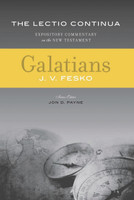
Fesko, John V.
Galatians (Fesko): The Lectio Continua Expository Commentary on the New Testament - 2nd Ed.
Description
In the book of Galatians, the apostle Paul presents a fiery defense of the gospel in an attempt to pull the Galatian church back from the edge of apostasy. Author J.V. Fesko uses a simple, expository style to help readers understand how justification, sanctification, and adoption come by faith in Christ alone. Fesko weaves biblical and systematic theology to uncover the Old Testament roots of the gospel and distill clear doctrinal statements from the Scriptures. His commentary is practical, leading the reader in this present to live by faith and walk by the Spirit. Part of the Lectio Continua commentary series.
Contents
Series Introduction
Preface
Introduction
Endorsements
“The beauty of Galatians by J.V. Fesko is that the author is both an experienced expositor and tested theologian. He, therefore, helps Christians who are seeking to be both faithful to the text and theologically informed. Like a mentor, Fesko leads readers through the delightful gospel treasures of Galatians. This is a great go-to commentary.”
—Patrick Abendroth, pastor of Omaha Bible Church, author of Covenant Theology, and host of the Pactum podcast
“The same tendency to rely on human contribution to one’s salvation still influences many professing Christians today. Legalism is both an ancient and a modern danger. The remedy, as Fesko warmly and clearly stresses throughout this volume, is to realize continually the centrality of the person and work of Christ in our justification, adoption, and sanctification.”
—Malcolm Maclean, pastor of Greyfriars Free Church of Scotland, Inverness, Scotland
“The Holy Spirit often uses false teaching for good by leading the church to clarify the truth. False teaching about the gospel in Galatia led to the Spirit giving us one of the greatest and clearest expressions of the gospel in Paul’s letter to that church. In this commentary on Galatians, J. V. Fesko presents the gospel, focusing on the key themes of justification, sanctification, and new creation, all of which reflect Paul’s key concerns. Particularly outstanding are Fesko’s careful attention to the Old Testament background of Paul’s thought and the way in which he presses Paul’s gospel home without getting sidetracked with controversies. He wisely presents Jesus Christ as the sum of the gospel in both Testaments, and he skillfully avoids dividing Reformed readers over potentially contested issues. More than a commentary, this work is a coherent book, delightfully leading us through justification and sanctification by faith in Christ alone and elevating our hearts to heaven as eternal life has begun in us now.”
—Ryan M. McGraw, Morton H. Smith Professor of Systematic Theology, Greenville Presbyterian Theological Seminary
About the Author
J. V. Fesko is Harriet Barbour Professor of Systematic and Historical Theology at Reformed Theological Seminary, Jackson, Mississippi, and an ordained minister in the Orthodox Presbyterian Church. Dr. Fesko’s specializes in early modern Reformation and post-Reformation theology, the integration of biblical and systematic theology, and soteriology, especially the doctrine of justification. Dr. Fesko has authored or edited more than twenty books and written fifty published essays for various journals and books.